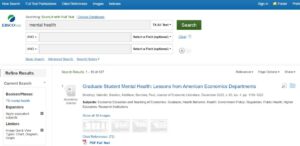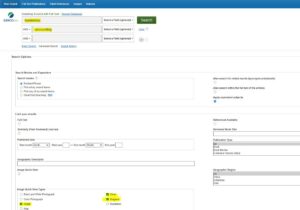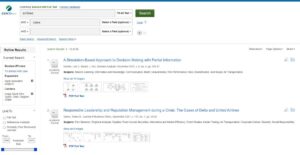The Emory community has access to a wealth of business research databases. This series highlights many of these great resources, including content and the best applications for classes and career prep.
What Will You Find?
EconLit covers a variety of economic topics, including auditing, capital markets, econometrics, economic forecasting, environment economics, labor economics, monetary theory, urban economics, and more. Content is drawn from the American Economic Association’s database, and includes full-text scholarly articles from economic journals, books, dissertations and working papers. Popular titles include American Economic Review, Journal of Risk & Financial Management, Journal of Accounting, Auditing & Finance, Journal of Economic Literature, and AEA Papers and Proceedings.
You can get started with a keyword search, and then use advanced search features to narrow your search. For example, you can choose to limit your search to results with a “chart / graph / diagram” to ensure you return articles that include images for use in your research.
Use for Class Projects
EconLit’s journals provide an economic perspective to consider when researching business issues. These journals are often used in conjunction with business trade publications found in databases such as Factiva or Business Source Complete. Considering multiple perspectives will help you make informed recommendations based on credible information about company strategies and industry trends.

Use for Interview Prep
Journals from EconLit can help you stay current on topics relevant to your future career path. Try searching for a topic and add the keyword “case” to review case studies of various firms and industries. These can help you prepare for you own case and technical interviews, as well as demonstrate your interest in the industry.
You can also use the Business Research Guide to locate additional business resources, locate tips for how to use them, and understand which are best for your specific research needs.


